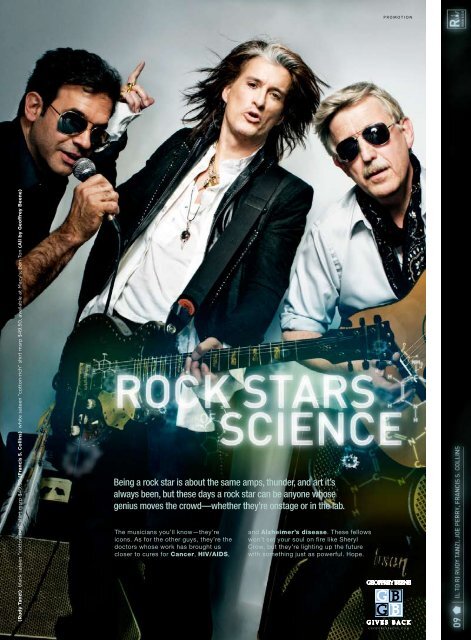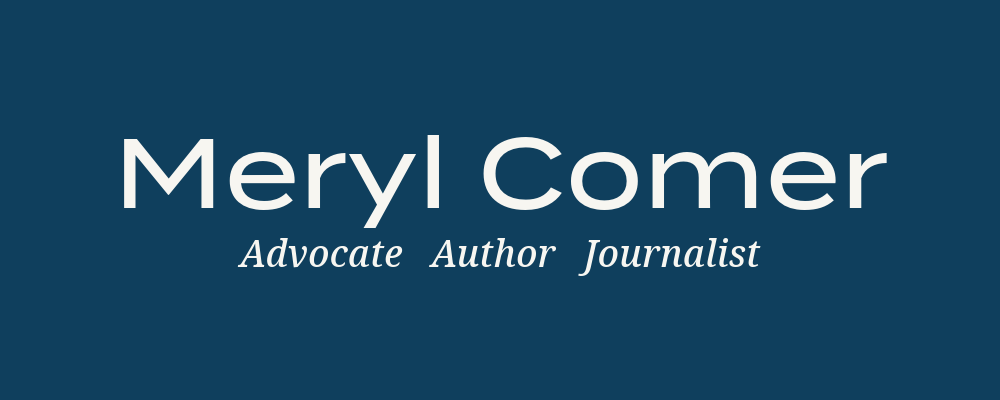GBFAI Timeline
The Geoffrey Beene Foundation Alzheimer’s Initiative (GBFAI) was launched in 2007 as a major charitable beneficiary of the Geoffrey Beene Foundation – to fight Alzheimer’s – a fatal degenerative, neurological disease that has no cure.
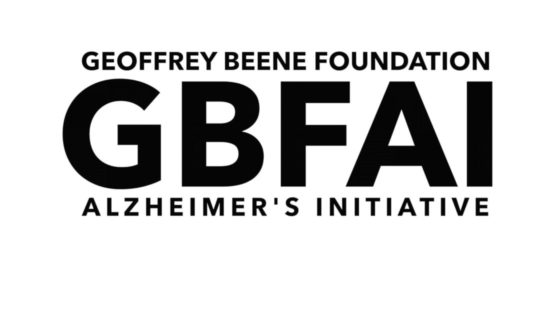
The Geoffrey Beene Foundation Alzheimer’s Initiative was launched in 2007 as a major charitable beneficiary of the Geoffrey Beene Foundation – to fight Alzheimer’s – a fatal, degenerative, neurological disease that has no cure. The Initiative is a philanthropic, not for-profit 501(c)(3), committed to providing catalyst funding to innovative new projects that advance awareness, diagnosis and research in early stages of Alzheimer’s disease.
The Geoffrey Beene Foundation Alzheimer’s Initiative, underwritten by the Geoffrey Beene Foundation with contributions in excess of $4.8 million, have been made to support groundbreaking awareness programs and next generation research in early diagnostics. “Not unlike cancer, the Geoffrey Beene Foundation’s lead philanthropic cause, most researchers agree that the greatest potential to stop Alzheimer’s lies in the earliest stages of the disease, which is why we fund translational research. Innovative Challenges help to support that mission,” said Tom Hutton, the Trustee and Chief Executive Officer of the Geoffrey Beene Foundation and President and Chief Executive Officer of Geoffrey Beene, LLC. “We must redefine the solutions process and free the greatest minds of our time to do the work and to help save and improve lives.”
The Geoffrey Beene Alzheimer’s Initiative’s mission is engaging a new generation of innovation. Even though experts now widely agree that early stages of Alzheimer’s hold the key to treatment and prevention, individuals with early Alzheimer’s have always been difficult to identify and costly to study in traditional clinical trial-based research. As a result, the scientific community has only begun to understand initial, pre-symptomatic disease progression and potential therapeutic options. The Geoffrey Beene Alzheimer’s Initiative focuses on this relatively new field of research.
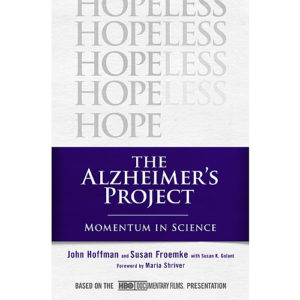
Marquis sponsorship of HBO’s pioneering, The Alzheimer’s Project (a five-part documentary series, starring Maria Shriver) – recognized as the first of its kind to shine a light on the impact of the disease on families and the quest of researchers to find a disease modifying therapy. The Alzheimer’s Project features a four-part documentary series, 15 short supplemental films, a robust website, and a nationwide community-based information and outreach campaign. A book, published by Public Affairs Books, was developed by the producers as a companion to the project. HBO used all of its platforms, including the HBO main service, multiplex channels, HBO On Demand, HBO Podcasts, hbo.com, HBO Channel on YouTube, and DVD sales to support the project. In addition, all films are streaming free of charge on hbo.com and offered for free on multiple platforms by participating television service providers. The Alzheimer’s Project is a presentation of HBO Documentary Films and the National Institute on Aging at the National Institutes of Health, in association with the Alzheimer’s Association®, Fidelity® Charitable Gift Fund, and Geoffrey Beene Foundation Alzheimer’s Initiative. The series producer is John Hoffman; the executive producers are Sheila Nevins and Maria Shriver.
Two Primetime Emmy Awards for HBO’s The Alzheimer’s Project (2009).
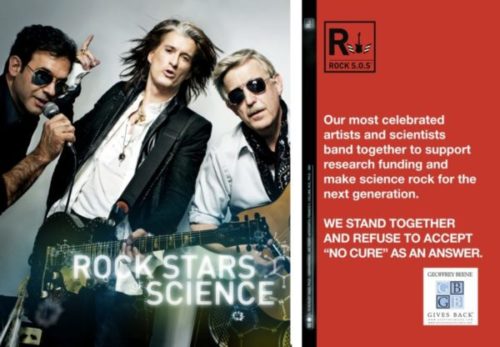
Geoffrey Beene Presents Rock Stars of Science, a nationally recognized public service campaign, launched in 2009-2010, resulted in an invitation from the co-chairs of the biomedical research caucus to celebrate the campaign scientists on Capitol Hill. Seven years later, the series of PSA campaign spreads that first appeared in GQ magazine and ran through 2013, are still spotted at the NIH, and in airports and malls around the country. The designation of the title is also proudly written into the bios of many of the top researchers across cancer, heart, HIV-AIDS and Alzheimer’s, who appeared in this spirited campaign.
Click here to see all of our 2009 Rock Docs.
UPDATE: An NIH salute to the campaign in their exhibition at the 4th USA Science & Engineering Festival, the largest STEM education event of its kind in the United States. The April 16-17, 2016 Festival drew more than 350K+ attendees to celebrate science at the Expo.

11:30 am
Welcome
Terry Moran, ABC News’ Nightline
Meryl Comer, Rock Stars of Science & Geoffrey Beene Gives Back® Alzheimer’s Initiative
Alzheimer’s 2020: Investment in Our Future
Terry Moran: Interview with Co-Chairs, Congressional Task Force on Alzheimer’s Disease
Representative Edward Markey (MA)
Representative Chris Smith (NJ)
Senator Mark Warner (VA)
Senator Susan Collins (ME)
Vision for 2020 and Alzheimer’s Facts
George Vradenburg, Geoffrey Beene Gives Back® Alzheimer’s Initiative & LEAD-Leaders Engaged on Alzheimer’s Disease
Robert Egge, Alzheimer’s Association/Alzheimer’s Study Group
By 2020: Research Momentum to Alzheimer’s Breakthrough
Moderator: Terry Moran
Panel: Jeffrey Cummings, MD, UCLA
Steven T. DeKosky, MD, University of Virginia
Samuel Gandy, MD, PhD, Mt. Sinai
Ron Petersen, MD, PhD, Mayo Clinic
New Poll Data: Public Awareness and Attitudes about Alzheimer’s
Alysia Snell, Lake Research Partners
advocacy for Research: What’s needed now
Mary Woolley, Research!America
The Rock Star & the Scientist: Same Brain Waves
Moderators: Meryl Comer and Terry Moran
Panel: Joe Perry, Aerosmith
Dale Schenk, PhD, Elan
Rudy Tanzi, PhD, Harvard University
Rock S.o.S Mascot: Blip, ECAD–East Coast Assistance Dog for Vets
1:00 pm
Rock Stars of Science tribute: Biomedical Research
Rerry Moran: Interview with Co-Chairs, Congressional Biomedical Research Caucus
Representative Brian Bilbray (CA)
Representative Mike Castle (DE)
Representative Rush Holt (NJ)
Vision, Priorities for the NIH
Francis S. Collins, MD, PhD, Director, National Institutes of Health
Musical Tribute to Congressional Champions of Research
Music Performance: Joe Perry,Aerosmith
Francis S. Collins, MD, PhD, NIH
David Hull, Joe Perry Project
Rudy Tanzi, PhD, Harvard
Joe Ryan, NHGRI
HIV/AIDS and H1N1: Update & Forecast
Anthony Fauci, MD, Director, National Institute of Allergy and Infectious Diseases
2:15 pm
Frontiers of Cancer Research and Stand Up to Cancer (Su2c)
Moderator: Terry Moran
Panel: Delta Goodrem, Singer/Actor, Cancer Survivor
Amy Dockser Marcus, Wall Street Journal
Laura Shawver, PhD, Phenomix Corporation, SU2C Scientific Advisory Committee
Laura Ziskin, Filmmaker, SU2C Leadership Council, Cancer Survivor
Special Performance: “Believe again” Delta Goodrem
2:45 pm
Grand Finale: All Rock Stars
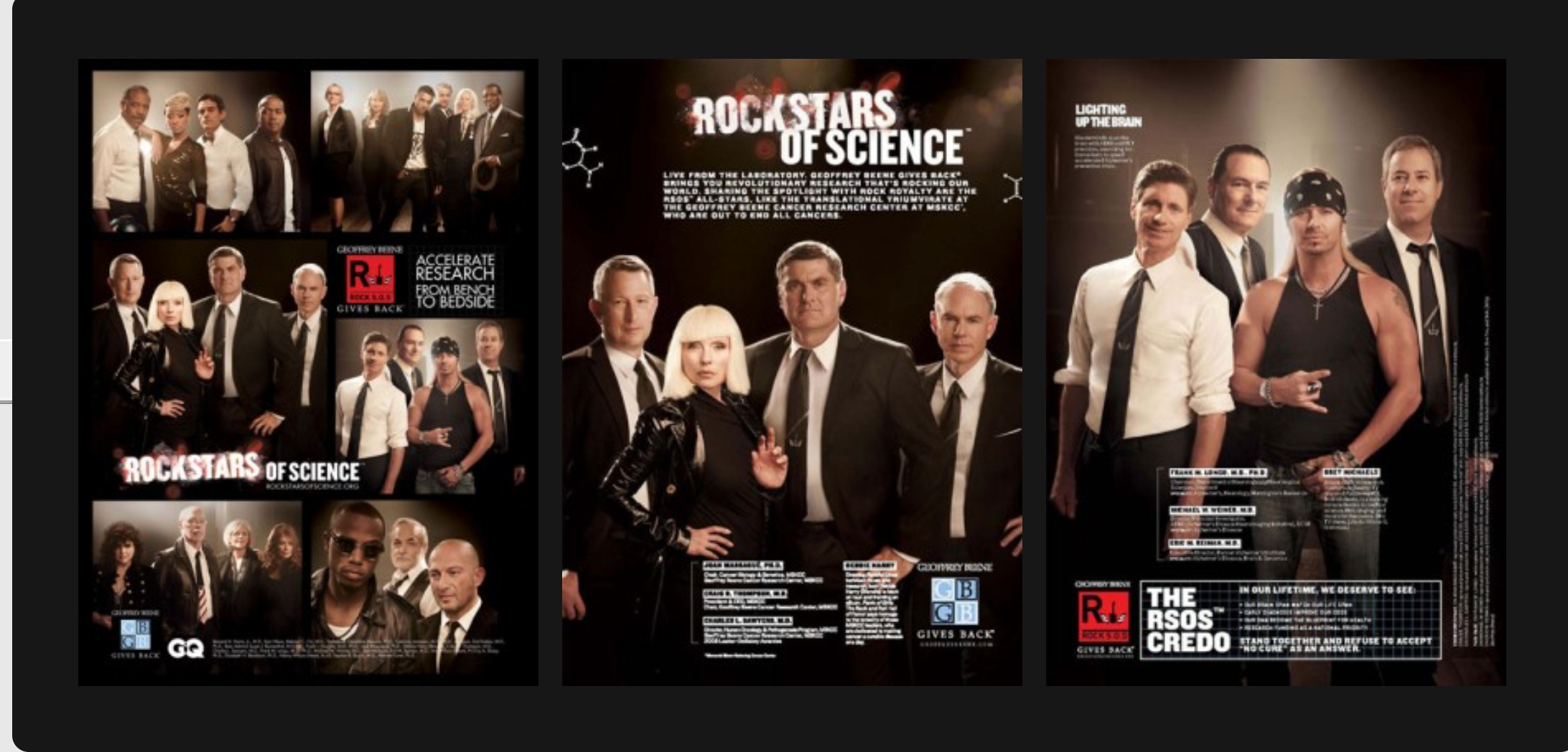
Geoffrey Beene Presents Rock Stars of Science 2010 campaign, featured in GQ’s blockbuster “Men of the Year” Edition, spotlights Rock Mega Stars Blondie’s Debbie Harry, Bret Michaels, Timbaland, Jay Sean, Keri Hilson, B.o.B and Heart (Ann and Nancy Wilson).
The campaign pays special tribute to leadership in translational cancer research: the Geoffrey Beene Cancer Research Center at Memorial Sloan-Kettering Cancer Center (GBCRC), ADNI/Brain-Imaging, Alzheimer’s Prevention Trials, Stem Cell, Stand Up 2 Cancer (SU2C), Heart/Integrative Medicine, NASA-inspired Telemedicine, Autism, Global Health and Children’s Rare Diseases.

New York’s JFK & Newark Airports. New Jersey’s PATH Trains. Chicago, Los Angeles, San Francisco Malls and Bus Stops.
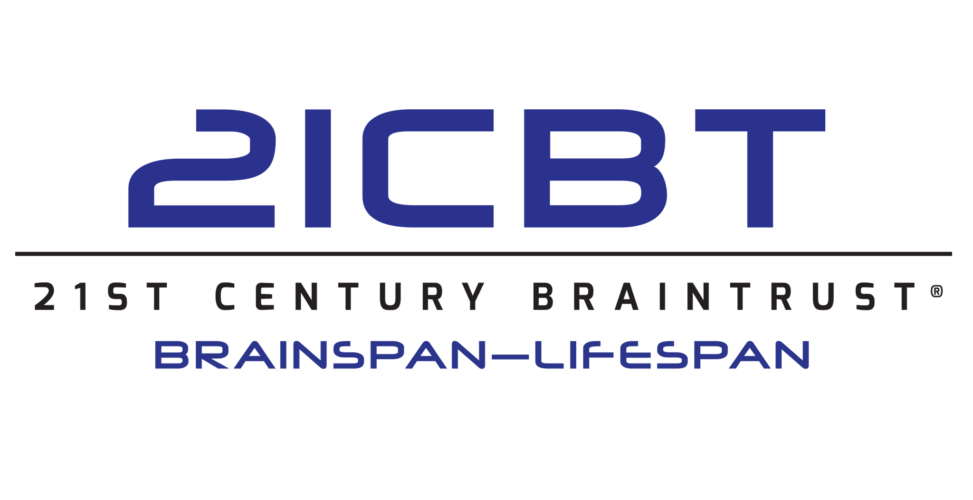
21st Century BrainTrust® (21CBT) (a non-profit partnership) award from SANOFI, to advance mobile health technologies and brain health.
Through engagement in 2012 in high-profile initiatives that: i) advanced early diagnosis; ii) raised our profile; and iii) judiciously leveraged our financial resources.
Proposal for Tracking Brain Health with Mobile App Wins $100,000
Sanofi Collaborate/Activate Innovation Challenge Recognition – 21st Century BrainTrust™ Idea Empowers Citizens to Take Control of their Own Cognitive Health
Washington, DC: December 2012 -The 21st Century BrainTrust, a coalition of four non-profit organizations working to end Alzheimer’s disease, was today named the winner of a $100,000 prize as part of the Sanofi US Partners in Patient Health Collaborate | Activate Innovation Challenge. The team was selected for the prize from among nearly 300 proposals submitted to the Challenge.
The 21st Century BrainTrust™ (21CBT), a collaboration lead by Geoffrey Beene Foundation Alzheimer’s Initiative (GBFAI), the American Health Assistance Foundation (AHAF), the UsAgainstAlzheimer’s Network, and the Cleveland Clinic/Lou Ruvo Center for Brain Health, believes that the time has come to develop self-administered cognitive testing applications (apps) which individuals can use to measure their brain health over many years, helping scientists in the fight against cognitive disorders.
“The 21st Century BrainTrust moves the conversation for the ‘worried well’ away from denial about a disease we all dread to one focused on optimal health,” said Meryl Comer, President of the Geoffrey Beene Foundation Alzheimer’s Initiative. “Big ideas today need to offer a sense of empowerment. We think we’ve found one in wireless technology that can turn us into citizen scientists dedicated to our personal cognitive health.”
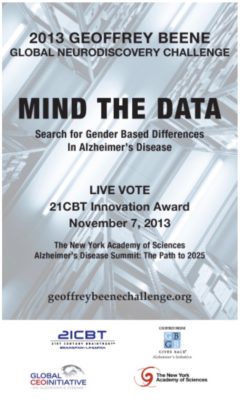
The 2013 Geoffrey Beene Global NeuroDiscovery Challenge, launched by the Geoffrey Beene Foundation Alzheimer’s Initiative, asked researchers to articulate the best hypothesis and research plan to discover the reasons for sex-based differences in AD progression. This rigorous scientific challenge, vetted by the NIA, with $100,000 in awards, exceeded expectations in terms of both scientific interest and global outreach, with more than 800 open project rooms from 65 countries.
- The two-tier judging process commenced September 6th and was conducted over an eight-week period. The four winners/finalists of Round One, announced on October 31, 2013, shared in $50,000 in awards from GBFAI.
- Online voting for the Round Two $50,000 21CBT Innovation Award winner ran November 1–5, 2013. The results of the online/live voting attracted 6,500 votes from 36 countries.
- A live vote took place November 7, 2013 before 500+ of the world’s best-and-brightest Alzheimer’s minds at the Alzheimer’s Disease Summit: The Path to 2025, presented in New York City by The New York Academy of Sciences, National Institute on Aging/NIH, and the Global CEO Initiative on Alzheimer’s Disease.
This challenge built on the momentum of our first and second challenges: i) the first, completed in Q2 2012, in partnership with The Alzheimer’s Immunotherapy Program (AIP) of Janssen Alzheimer Immunotherapy, and Pfizer Inc; and ii) the second, relating to the causes of sex-based differences in AD presentation. We do believe that our direct engagement with FNIH as a challenge partner, and the NIA in a technical advisory, on this “first of its kind” challenge in the AD space helped influence the recent 2016 announcement below from the NIH.
IMPACT: NIH Grant to Fund Research on Alzheimer’s in Women
Update: A new Alzheimer’s disease research project has just been funded, as a team of researchers from the University of Arizona Health Sciences Center for Innovation in Brain Science recently received a $10.3 million grant from the US government. According to a report from AZ Big Media, the five-year Program Project Grant from the National Institute on Aging at the National Institutes of Health will fund a study to be led by University of Arizona neuroscientist, Dr. Roberta Diaz Brinton, in hopes of discovering why women are more prone to Alzheimer’s disease than men are.

Dr. Enrico Glaab, Ph.D., research associate at the Luxembourg Centre for Systems Biomedicine, University of Luxembourg, has been named winner of the 21 CBT Innovation Award in Round 2 of the 2013 Geoffrey Beene Global NeuroDiscovery Challenge. It is the first-ever innovation challenge that seeks to identify male/female differences in Alzheimer’s Disease (AD). Glaab will receive a $50,000 Innovation Awards from the 21St Century BrainTrust® to continue his research. Glaab will also share in a $50,000 award for “Best Hypothesis” from the Geoffrey Beene Foundation Alzheimer’s Initiative as one of four finalists of this global online competition. Read more…

The Feasibility of At-Home iPad Cognitive Testing For Use in Clinical Trials:
Dorene M. Rentz, PsyD1,5, Maria Dekhtyar2, Julia Sherman3, Deborah Blacker, MD, ScD4, Rebecca E. Amariglio, PhD5, Kathryn V. Papp, PhD5, Adrian Schembri, DPsych6, Tanya Chenhall, MA6, Paul Maruff, PhD6, Paul Aisen, MD7, Reisa A. Sperling, MD1,5 and Bradley T. Hyman, MD, PhD1
Validation of CogState on iPads for Self-Administration:
- From a clinical trial perspective, self-administered cognitive tests would greatly reduce the burden of in-clinic visits and enable participation of individuals residing anywhere and everywhere
- Self-administration would also allow for multiple assessments within a shorter timeframe, potentially increasing the reliability of cognitive endpoints that can translate into a more sensitive measurement of change over time
- More importantly, self-assessments could also promote the rapid evaluation and feedback on “brain health” among individuals in the community, empowering them to seek care, change behaviors or become involved in research

A five-year FNIH plan to collaborate with the FDA, ten big drug companies, and eight non-profit organizations that focus on specific diseases, to unravel the molecular pathways that lead to Alzheimer’s, Type 2 diabetes, rheumatoid arthritis and lupus—and to investigate new methods to track a disease’s progress, that could provide early reads on how a drug is affecting it. The objective is to “ensure we expedite translation of scientific knowledge into next generation therapies.” The roughly $230 million is being spent over five years in the first round of the AMP project, and was split roughly evenly between the NIH and drug companies.

The IRB-approved Health-eBrain Study launched September 29, 2014 at the REACT/AARP conference with our partners under the 21st Century BrainTrust®, studied the impact of the toll of caregiving on caregivers.
The long-term goal of this technology-driven health optimization research initiative is to provide the individual caregiver with self-assessment tools to longitudinally track their health in order to:
- Support and validate the need for healthy, proactive caregivers for the recruitment and success of participation in clinical trials
- Recruit and engage caregivers as clinical research partners/surrogates for patient-reported outcomes through the use of mobile applications for longitudinal data collection
- Trigger earlier engagements with and interventions by the clinician community around early diagnosis of MCI
In the three months following launch, over two-thirds of the 1,000 participants completed the survey and took the brain performance test. This level of response validated the potential of virtual cohorts (recruitment/cost-savings) for future clinical trial design. Final analysis of the data sets offered striking results. In the study survey, caregivers report themselves as coping well, while the brain performance tests showed that 57% were operating at less than 50% cognitive vitality.
This demonstration research supports mobile platforms developed to assess depression, stress levels, self-care activities, adherence to medications, and passive biometric tracking of vital signs.

Slow Dancing With A Stranger (New York Times Bestseller, October 2014) (see merylcomer.com (per HarperCollins) for full book related appearances and reviews) was listed as a New York Times and Washington Post Bestseller (both as hard-cover, and in paperback launched September 2015, with a companion audio version). 100% of proceeds Supports Alzheimer’s Research.
“A cry from the heart of Meryl Comer calls us to confront the scourge of our generation. Alzheimer’s disease is laid bare as a slow killer of the health and spirit of the caregiver, the secondary victim, who sacrifices her career and identity to care for a loved one who is lost but still here. Comer’s pain is contained in elegant writing and finally channeled into a worthy purpose. But we cannot forget the human cost. Read and recommend this book as a call to action as haunting and urgent as Rachel Carson’s Silent Spring.”
–GAIL SHEEHY, author of Passages in Caregiving and Daring: My Passages
“In an unvarnished account of caring for a husband with dementia, Meryl Comer lays out the struggles and gallantry of a devoted and remarkable caregiver.”
–PETER V. RABINS, M.D., M.P.H., professor of psychiatry and behavioral sciences, Johns Hopkins School of Medicine and author of The 36-Hour Day
“No silver linings, no phony homages to ‘spiritual growth.’ Meryl Comer in Slow Dancing with a Stranger writes the unvarnished reality of being exposed as a wife, daughter, caregiver, and potential Alzheimer’s victim herself. Admire her bravery and honesty and applaud her for taking away some of the loneliness of the long distance caregiver.”
–ELLEN GOODMAN, Pulitzer Prize-winning, nationally syndicated columnist and author of Turing Points, Value Judgments, and Paper Trail: Common Sense in Uncommon Times
“Slow Dancing with a Stranger is a remarkable and moving story that will change the way our generation thinks about how we deal with aging and caring for those we love. An amazing journey of caring, love, and resilience.”
–TOM RATH, bestselling author of StrengthsFinder 2.0, How Full Is Your Bucket?, Strength Based Leadership, and Eat Move Sleep
“Meryl Comer in Slow Dancing with a Stranger unveils Alzheimer’s Disease in a remarkable and vulnerable way. Her personal story provides knowledge, inspiration, and hope to us all. Her heroism jumps out from the pages and hopefully will motivate generations to make a difference against this horrible disease.”
–DAVID B. AGUS, M.D., professor of medicine and engineering, University of Southern California and author of The End of Illness and A Short Guide to a Long Life
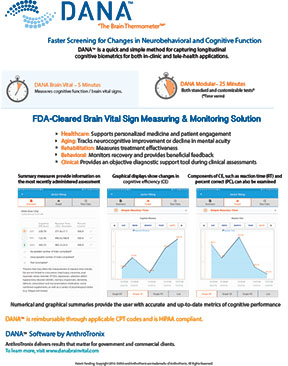
Since launch of our Phase I study, DANA (Defense Automated Neurobehavioral Assessment) was approved by the FDA in October 2014 (one of the first in the cognitive assessment space). The Defense Department is now reviewing a proposal to replicate our study in military caregivers.
Brain Thermometer (Defense Automated Neurobehavioral Assessment – DANA) for Mild Dementia: Pilot Study – Burke Rehabilitation Hospital
Principal Investigator: Dr. Corinna E. Lathan, Clinical Collaborating Institution (CCI), Burke Rehabilitation Hospital; CCI-PI: Dr. Pasquale Fonzetti; Advisor: Dr. Murali Duraiswamy, Duke University
“A Pilot Study to Determine the DANA Assessment Tool’s Sensitivity and Mild Cognitive Impairment.” The purpose of this study was to gather initial data on whether DANA might also be useful to detect cognitive deficits in patients with mild cognitive impairment or Alzheimer’s disease compared to cognitively normal controls. The revised and expanded protocol focused on a cohort of patients with mild, probable Alzheimer’s and their caregivers.
The protocol had two objectives: the first hypothesis was that DANA would have a higher sensitivity to MCI than the current gold standard, which is the MMSE. Higher sensitivity could lead to early detection of MCI and earlier intervention.
The second hypothesis was that caregivers would be able to both self-administer DANA, as well as administer DANA to their loved one, and that the test would be stable over the 30-day period. This study not only confirmed the sensitivity of DANA to MCI, but also set the stage for a caregiver-focused application on detecting cognitive impairment due to depression.
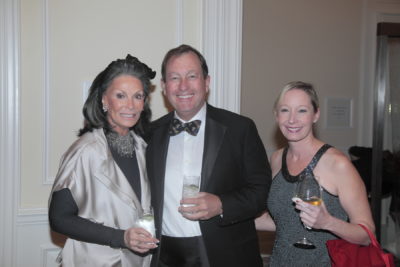
Meryl Comer, President of the Geoffrey Beene Foundation Alzheimer’s Foundation receives the Dr. Herbert Wertheim Global Medical Leadership Award at the Sapphire Gala. November 1, at the Trump National Doral Miami. The event,in support of the physicians of tomorrow, brought together more than 500 of South Florida’s medical, business, philanthropic, and civic leaders and raised more than $330K for student scholarships.
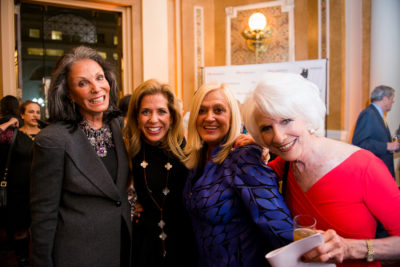
Diane Rehm Hosts 2015 Great Ladies Luncheon & Fashion Show
On Wednesday, April 15, 2015, renowned journalist and NPR host Diane Rehm welcomed guests to the Alzheimer’s Drug Discovery Foundation’s (ADDF) Fifth Annual Great Ladies Luncheon & Fashion Show at The Ritz-Carlton in Washington, DC.
Rehm, who has long used her public platform to raise awareness for Alzheimer’s disease, spoke eloquently about the need to increase support for drug discovery for Alzheimer’s. She also expressed hope for the future, noting that “there are hundreds of new, potentially disease-modifying drugs in the pipeline.”
The Great Ladies Luncheon & Fashion Show is the brainchild of Elise Lefkowitz, a well-known Washingtonian who lost her mother, Estelle Gelman, to Alzheimer’s disease. Elise and her husband Marc generously underwrite the fashion extravaganza on an annual basis.
In its fifth year, the Neiman Marcus-sponsored event featured a runway show with designs from Akris’ Fall/Winter 2015/16 Collection. The Swiss-luxury brand is immensely popular among the DC social set.
This year’s Luncheon & Fashion Show honored Emmy-Award winning journalist and author Meryl Comer. Comer’s New York Time’s bestseller, “Slow Dancing with a Stranger,” details her painful experience caring for her husband, who suffers from early-onset Alzheimer’s disease.
Accepting her award, Comer said, “I fight for everyone who is well. I fight for all women because I want better options for them. And I fight because I don’t want my great grandchildren asking how their grandparent could forget them.”

GBFAI partnered on a successful joint clinical trial recruitment proposal, led by USA2, Mayo Clinic, University of Florida and UCSF’s Brain Health Registry. In mid-August, the Patient-Centered Outcomes Research Institute (PCORI) approved a $1.56 million, three-year grant for the creation of a patient and caregiver research network to bring those closest to Alzheimer’s and related dementias into the fold to accelerate a cure and understand its impact.
Principal Investigators for this PCORI project are Ronald Petersen, M.D., Ph.D., Director of the Mayo Clinic Alzheimer’s Disease Research Center and the Mayo Clinic Study of Aging, Dr. Glenn Smith, Professor and Chair, Department of Clinical and Health Psychology, University of Florida, and Meryl Comer, President of the Geoffrey Beene Foundation Alzheimer’s Initiative and lead Founder of 21st Century BrainTrust™.
The AD-PCPRN hopes to enroll large numbers of individuals into the network through innovative web and mobile-based tools that will greatly expand researchers’ understanding of brain health, and the impact of the disease and treatments on quality of life. Importantly, it will also screen and help individuals into appropriate clinical trials and studies.
Particular attention will be given to involvement and recruitment of patients and caregivers in minority communities. This PCORI grant also elevates the caregiver status, and respects that most of us traded-in professional careers to care for loved ones. Armed with the latest mobile applications, we can be empowered as active partners in research.
GALAXY supports the 3-year goals of the AD-PCPRN. It is an online platform for clinical trial mobilization, and a communications bridge between the AD-PCPRN and GAP (Global Alzheimer’s Platform), dedicated to the recruitment of the right patient for the right trial in order to enable research to be conducted faster, less expensively and on a far greater scale, driven by the power of BIG data.
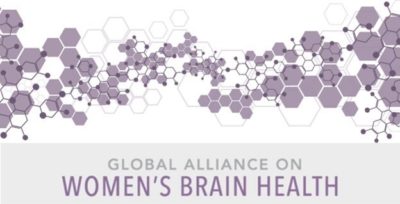
Leaders from Canada, the United States and the United Kingdom announced Global Alliance on Women’s Brain Health to raise awareness of women’s brain health challenges, and significantly expand funding for sex-based, brain health research that benefits both men and women.
- Launched October 26, 2015 in Los Angeles at Gagosian Gallery
- December 17, 2015 in Lausanne, Switzerland
- February 24, 2016 in London at World Dementia Council
- July 25, 2016 in Toronto at AAIC
- October 27, 2016 in Geneva, Switzerland
- March 21, 2017 Support launch of Women’s Brain Project- Switzerland
- May 29, 2018 Swedish Care International – Stockholm
- June 4-6, 2018 Brussel’s Economic Forum (Salon Dinner)
- July 13-15 2018 Aspen Brain Labs /Access Circle Symposium
- July 23, 2018 Reception – AAIC Chicago
The Global Alliance on Women’s Brain Health will define a scientific agenda, drive new funding for research, and convene scientific leaders to assure the most rapid and effective scientific strategies in women’s brain health. With the population of the world aging and much of the increase in dementia taking place in low and middle-income countries, the Global Alliance on Women’s Brain Health also plans to expand to regions outside of North America and the UK, including Africa and Asia.
“Women have been looking into the wrong mirror when it comes to Alzheimer’s. We are either in denial or overwhelmed. It’s a disease that emotionally and financially jeopardizes families and makes us all ‘second-hand victims.’ It’s critical that what happens to us be factored into the data,” said Meryl Comer, President of the Geoffrey Beene Foundation Alzheimer’s Initiative and Co-Founder of the 21st Century BrainTrust. “The way to beat the odds is for women leaders globally to leverage their economic and political clout.”

Study Conclusions – CTAD Announcement 2015
The findings of this pilot study suggest that reliable cognitive data can be obtained from iPad assessments in the home environment without the assistance of a trained administrator. The at-home and in-clinic assessments were correlated with standard neuropsychological tests at a similar magnitude, but the at-home assessments did not reach statistical significance due to small sample size. With everyone receiving initial in-clinic training, a very high percentage of older individuals completed the majority of at-home assessments without any assistance. The major limitation was selecting the appropriate test version each day, not the ability to do the tests. These findings suggest that with selected iPad modifications and automation of test version selection, the feasibility of doing at-home assessments shows promise for inclusion into clinical trial designs.
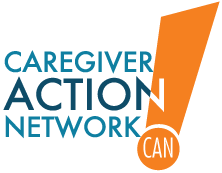
Elizabeth Dole, who heads the Elizabeth Dole Foundation for Wounded Warriors, is a Board Member of CAN and was in the front row to watch John Schall, CEO, engage in a “fireside chat” with the Senator and to officially bestow the award. It was particularly exciting for me as I worked on Mrs. Dole’s personal staff when she was the Secretary of Labor under President George Herbert Walker Bush. She has been such a great mentor throughout my career, talking about using our abilities and talents to reach our full potential. It was fun to see them and to talk up close and personal. Others recognized included Congresswoman Michele Lujan Grisham (D-NM), Meryl Comer, President of the Geoffrey Beene Foundation Alzheimer’s Initiative and David Badeen, Vice President, Sam’s Club HealthCare.

The Alzheimer’s Prevention Registry (APR), launched with catalyst funding from the Geoffrey Beene Foundation Alzheimer’s Initiative, enrolled its 200,000th volunteer interested in participating in studies aimed at preventing the disease, a significant milestone in the fight against Alzheimer’s. Hosted and championed by Banner Alzheimer’s Institute (BAI), in collaboration with partner organizations and leading scientists, the Registry continues to establish itself as the vanguard of a national movement to prevent Alzheimer’s by accelerating enrollment into critical prevention research studies.
“The research to fight Alzheimer’s needs faster ways to evaluate promising prevention therapies and more efficient mechanisms to enroll interested participants in prevention trials,” said Jessica Langbaum, PhD, principal scientist at BAI, associate director of the Alzheimer’s Prevention Initiative (API) and director of the APR. “The greater the pool of potential participants, the faster researchers will be able to find treatments to end this disease as quickly as possible.”
In 2011, BAI launched the API to accelerate the pace of Alzheimer’s prevention research, and in 2012, it created the APR to help researchers overcome recruitment barriers and enroll interested individuals into studies.
The Registry is an online community of healthy individuals who are committed to fighting the disease, informing them about the latest developments in Alzheimer’s prevention research, and connecting those who may be interested with scientists carrying out the studies. The Registry is currently recruiting for 32 studies and is bringing on new opportunities every month that will tap the Registry’s resources to recruit the volunteers they need to begin their research.

Leaders from Canada, the United States and the United Kingdom announced Global Alliance on Women’s Brain Health to raise awareness of women’s brain health challenges, and significantly expand funding for sex-based, brain health research that benefits both men and women.
The Global Alliance on Women’s Brain Health will define a scientific agenda, drive new funding for research, and convene scientific leaders to assure the most rapid and effective scientific strategies in women’s brain health. With the population of the world aging and much of the increase in dementia taking place in low and middle-income countries, the Global Alliance on Women’s Brain Health also plans to expand to regions outside of North America and the UK, including Africa and Asia.
“Women have been looking into the wrong mirror when it comes to Alzheimer’s. We are either in denial or overwhelmed. It’s a disease that emotionally and financially jeopardizes families and makes us all ‘second-hand victims.’ It’s critical that what happens to us be factored into the data,” said Meryl Comer, President of the Geoffrey Beene Foundation Alzheimer’s Initiative and Co-Founder of the 21st Century BrainTrust. “The way to beat the odds is for women leaders globally to leverage their economic and political clout.”

Leaders from Canada, the United States and the United Kingdom announced Global Alliance on Women’s Brain Health to raise awareness of women’s brain health challenges, and significantly expand funding for sex-based, brain health research that benefits both men and women.
The Global Alliance on Women’s Brain Health will define a scientific agenda, drive new funding for research, and convene scientific leaders to assure the most rapid and effective scientific strategies in women’s brain health. With the population of the world aging and much of the increase in dementia taking place in low and middle-income countries, the Global Alliance on Women’s Brain Health also plans to expand to regions outside of North America and the UK, including Africa and Asia.
“Women have been looking into the wrong mirror when it comes to Alzheimer’s. We are either in denial or overwhelmed. It’s a disease that emotionally and financially jeopardizes families and makes us all ‘second-hand victims.’ It’s critical that what happens to us be factored into the data,” said Meryl Comer, President of the Geoffrey Beene Foundation Alzheimer’s Initiative and Co-Founder of the 21st Century BrainTrust. “The way to beat the odds is for women leaders globally to leverage their economic and political clout.”
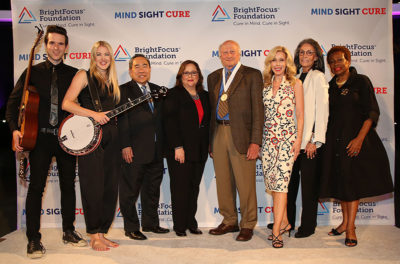
The BrightFocus Foundation will recognize the accomplishments and contributions of Meryl Comer, President & CEO of the Geoffrey Beene Foundation Alzheimer’s Initiative and UsAgainstAlzheimer’s board member. She is the author of the New York Times best-selling book Slow Dancing with a Stranger, an unvarnished account of her 22 year battle with her husband’s Alzheimer’s disease.
Tonight’s reception and dinner will be held at the Institute of Peace and will honor Comer with the award for public leadership for extraordinary advocacy on behalf of caregivers. She has been a dedicated champion in the fight to stop Alzheimer’s and brings awareness to the devastating toll that the disease has on victims and their families.
Other honorees of the event include UsAgainstAlzheimer’s board member Dr. Stanley Prusiner, Nobel Laureate; Dr. Dean Bok, 2016 Laureate; and Kim Campbell and members of Glen Campbell’s family who have worked to raise awareness for Alzheimer’s.
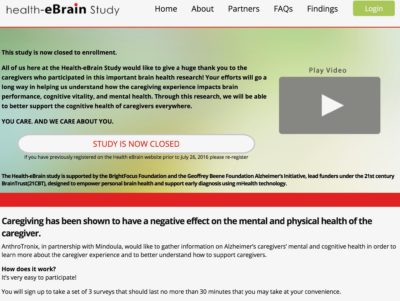
GBFAI continued its investment in mobile cognitive assessments through the Health-eBrain Study Round II with a Phase 2 launch in the 3rd quarter of 2016. Funded jointly through the 21CBT partnership with BrightFocus Foundation, the study builds on Phase I results and is designed to develop a dynamic brain health profile through naturalistic tracking of caregivers over three months. Cognitive assessment tools like Cogstate and Resilience will be downloaded, along with DANA, for tracking. A virtual intervention for depression (Mindoula) will be offered to a subset of subjects within the study who meet a certain threshold for depression (combination of self-report and BHP/DANA). Other modules will include medication and symptom tracker, stress and sleep inventories, fitness/activity monitoring and the PERMA-Profile.
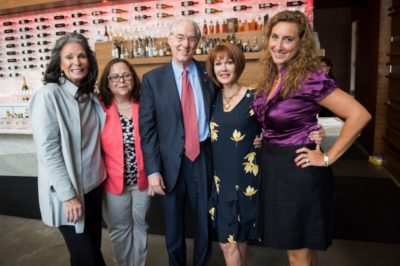
Leaders from Canada, the United States and the United Kingdom announced Global Alliance on Women’s Brain Health to raise awareness of women’s brain health challenges, and significantly expand funding for sex-based, brain health research that benefits both men and women.
The Global Alliance on Women’s Brain Health will define a scientific agenda, drive new funding for research, and convene scientific leaders to assure the most rapid and effective scientific strategies in women’s brain health. With the population of the world aging and much of the increase in dementia taking place in low and middle-income countries, the Global Alliance on Women’s Brain Health also plans to expand to regions outside of North America and the UK, including Africa and Asia.
“Women have been looking into the wrong mirror when it comes to Alzheimer’s. We are either in denial or overwhelmed. It’s a disease that emotionally and financially jeopardizes families and makes us all ‘second-hand victims.’ It’s critical that what happens to us be factored into the data,” said Meryl Comer, President of the Geoffrey Beene Foundation Alzheimer’s Initiative and Co-Founder of the 21st Century BrainTrust. “The way to beat the odds is for women leaders globally to leverage their economic and political clout.
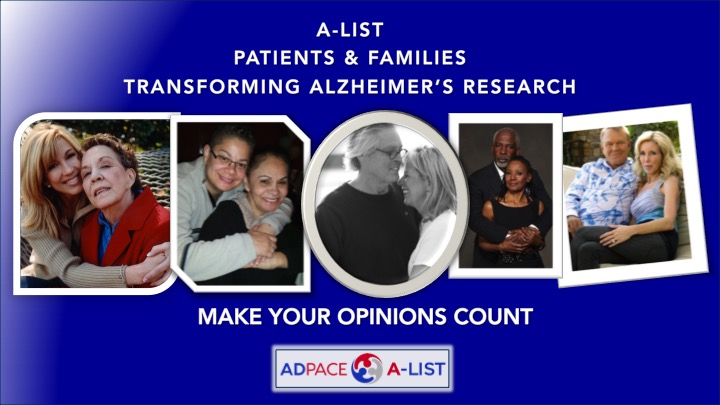
GBFAI, as part of its engagement role for the AD-PCPRN, led the design and development of the A-LIST – an online community dedicated to engaging the worried-well, those living with AD and their caregivers, around clinical trials. Our celebrities include Leeza Gibbons, B. Smith and Dan Gasby, Kim and Glen Campbell, and journalist Greg O’Brien with AD. There is currently analysis underway around applying our patient preference studies to FDA’s efforts to engage AD voices in drug development.
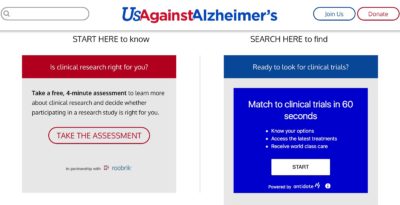
The 2016 3rd Quarter GBFAI efforts, in collaboration with the AD-PCPRN, focused on the launch of a partnership with Roobrik & Antidote to support recruitment for clinical trials at the Connected Partners Conference in Boston on October 17th.
(More than 80% of trials are currently delayed or closed because researchers cannot find eligible patients. This problem is especially pronounced in Alzheimer’s disease, where seven to ten million people are needed for registries to meet planned clinical trial enrollment requirements.)
This announcement is an extension of GBFAI’s 2nd quarter leadership in the AD-PCPRN, with an evolving new communications platform called GALAXY, that seeks to transform the research and clinical trial culture in order to accelerate research cycle times for disease modifying therapies.
Co-Funding Support: Geoffrey Beene Foundation Alzheimer’s Initiative and UsAgaintAlzheimer’s.

Stopping Alzheimer’s by 2025 requires innovation, collaboration and creativity. This ambitious goal necessitates the willingness to learn key lessons from other disease areas and to listen to those living with the disease. That is why at the third annual Lausanne Workshop, we will take a patient-centric and interdisciplinary approach to address ongoing challenges, report on progress toward our goal and propose future action to accelerate advances.
Each year, the Lausanne Workshop convenes international stakeholders in Lausanne, Switzerland to promote innovative strategies in Alzheimer’s research, regulation and access. It was rst held in 2014 as a response to the challenge articulated at the UK G8 Dementia Summit to stop Alzheimer’s by 2025. This goal was reinforced at the First World Health Organization Ministerial Conference on Global Action Against Dementia in 2015.
Since its launch, the Lausanne Workshop has advanced positive steps toward the 2025 goal and demonstrated the power of action-oriented collaboration across the dementia eld. This year, we will strive to articulate in a systematic and comprehensive way the values and treatment perspectives of the global community of those with or at risk of Alzheimer’s and other dementias as well as develop a clear and detailed understanding of the milestones – what is needed to happen by when and by whom – to reach the 2025 goal.
The workshop is organized under the auspices of The Organisation for Economic Co- operation and Development (OECD) and is supported by the State Secretariat for Education, Research and Innovation SERI, Switzerland, The Global CEO Initiative on Alzheimer’s Disease (CEOi) and Alzheimer’s Disease International (ADI).
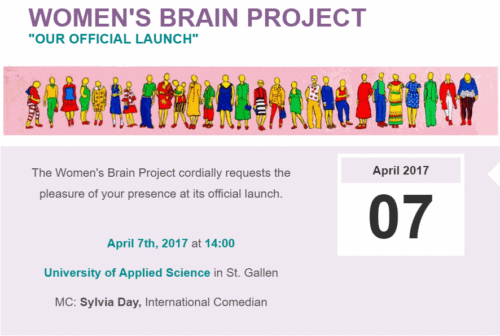
Founded in 2016, we are a group of scientists hailing from various disciplines including medicine, neuroscience, psychology, pharmacy and communication who work together with caregivers, patients and their relatives, policymakers and other stakeholders.
The Women’s Brain Project (WBP) aims to stimulate a global discussion on gender and sex determinants of female vulnerability to brain and mental disease.
We propose a new, personalized way to develop and perform medical treatments, caregiving and prevention strategies together with novel technologies development, based on consideration of sex and gender differences. By promoting a scientific discussion on the specific vulnerability of the female brain to particular mental and brain diseases, WBP advocates for the development of sex- specific measures to foster mental health

Leadership participation in the development of an Alzheimer’s X Prize with the XPRIZE Foundation, and our ongoing work with Harvard Medical School to validate a patient-administered mobile tool for the assessment of Brain Health. GBFAI partnered with the Dolby Foundation, AgeWave, EJF Philanthropies and UsA2 in the initial design phase.

About Us
- The A-LIST is a first-of-its kind online community of people with or at risk for Alzheimer’s disease, other dementias, and Mild Cognitive Impairment, along with current and former care partners.
- We are 6,000+ members strong and growing.
- We are using our collective voice to overcome scientific skepticism around the value of patient and caregiver engagement in research.
What We Offer
- What Matters Most: research surveys for diverse communities and across disease progression.
- Surveys on patient and caregiver preferences, patient-doctor relationships, clinical trials, caregiver health, and technology.
- A private, HIPAA-compliant database.

As we pass our 5th year anniversary, we hope that you’ll join us in celebrating what we have accomplished for advancing women’s brain health, help us honour those catalysts that have been instrumental in our success, and hear about how we plan to raise the bar moving forward.
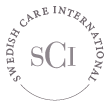
Dementia Forum X Working Meeting 2018
On 30th May 2018, we invited our partners of Dementia Forum X to the Dementia Forum X Working Meeting 2018. Dementia Forum X is a global initiative to take action on dementia. The biennial meeting in Stockholm is a day of reflections and discussions between a hundred of the world’s leading business executives, policymakers and other stakeholders from different fields.
The Dementia Forum X Working Meeting was held in Stockholm, Sweden, and aimed to follow-up on the conclusions from Dementia Forum X 2017 and to set new guidelines and discussion points for the next meeting in 2019. The one-day working meeting turned out to be very fruitful and insightful for our partners and us.
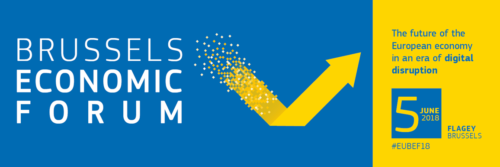
The Brussels Economic Forum is the flagship annual economic event of the European Commission.
The Forum brings together European and international policymakers, opinion leaders, academics, civil society and business leaders to debate hot economic topics and share new perspectives on Europe’s economic challenges.

In July, 2018, WHAM! (Women’s Health Access Matters) was launched in Aspen as an initiative of AccessCircles to focus on increasing awareness of women’s health issues and implementing strategies that will improve the inequities and bias in research and accelerate scientific discovery in women’s health. We are passionate about women’s health and the impact that we know can be made if research reflects how men and women are different down to the cellular level.
AccessCircles has consistently hosted Health and Wellness Forums in Aspen (July), and either Miami or Palm Beach (January). Throughout the years AccessCircles has hosted over 300 transformational experiences. In addition, private retreats (50-300 women) have been hosted at exclusive resorts and unique venues around the world for our community and our alliance partners.
We are committed to improving the health and wellbeing of women and transforming their medical care through the discovery, dissemination, and integration of sex and gender-based differences and the application of this knowledge to the delivery of care. With a focus on building awareness of Gender Precision Medicine, we intend to impact issues related to women’s health and gender biology and for advocating for changes in public policy to improve the health of women by advancing the new field of Gender Precision Medicine.
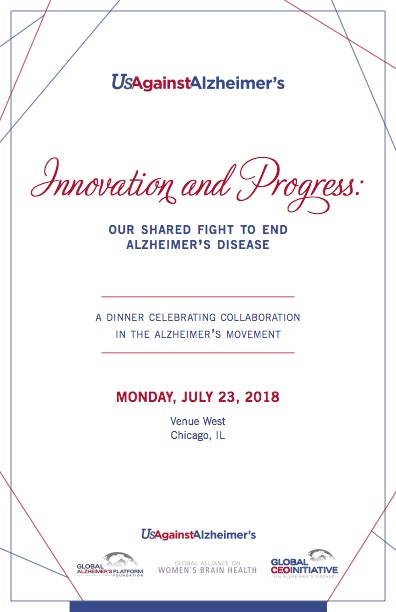
Tonight brings together leaders from across the healthcare ecosystem working with UsAgainstAlzheimer’s to discuss and develop collaborative solutions to the Alzheimer’s challenge. We won’t win this battle unless we’re building bridges across sectors and stakeholders to tackle Alzheimer’s.
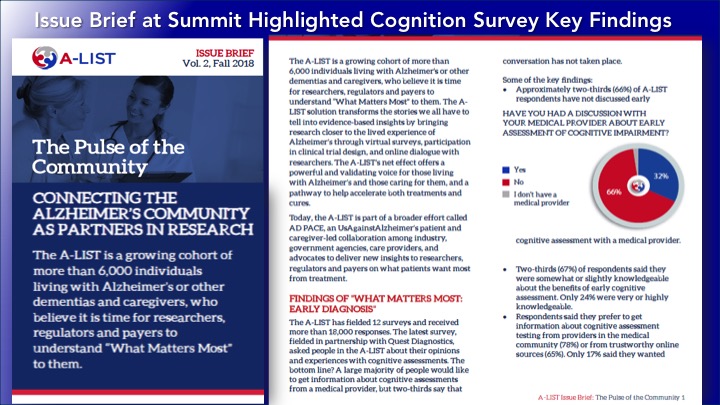
This event is the pinnacle of UsAgainstAlzheimer’s events and includes three movement-building days in Washington, D.C.
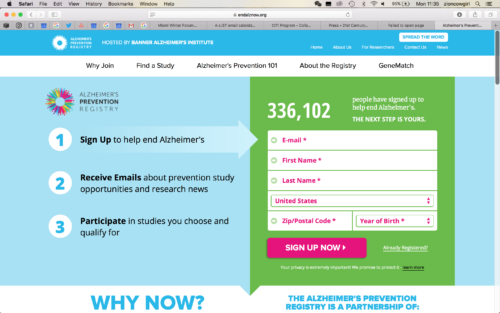
Scientists are making great progress in the fight against Alzheimer’s, but 80% of studies are delayed because too few people sign up. Will you help change that? When you join the Alzheimer’s Prevention Registry, you get opportunities to take part in research studies, plus Alzheimer’s news and research updates. Joining is easy and free, and you choose which studies to consider. Help create a legacy for generations to come. Join the Alzheimer’s Prevention Registry.
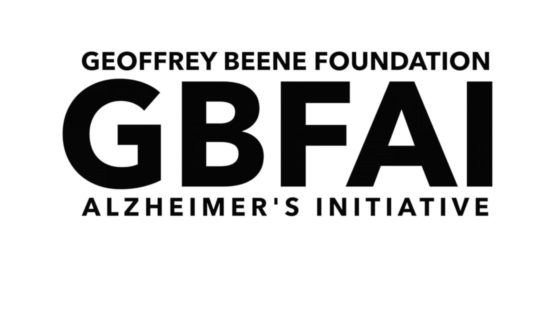
September 2007 – January 2019
The Geoffrey Beene Foundation Alzheimer’s Initiative (GBFAI) was founded with a vision for the future as a catalyst funder, targeting AD prevention through spirited public engagement campaigns, early assessment technologies, support of the first “virtual registry” as power pools for big data, and pre-clincial AD research to modify disease risk. Over the past decade, the scientific community has moved its research agenda closer to those targets as GBFAI demonstrated innovative leadership through its global sex-based research challenges, the “first AD virtual recruitment platform and early brain health initiative (21st Century BrainTrust).”
Over its decade plus history, GBFAI forged effective partnerships that successfully leveraged and more than doubled its philanthropic impact against dollars spent, while elevating the donor foundation profile and extending its presence beyond the set funding level. Today GBFAI continues to consolidate its collaborative initiatives into three domains: i) mobile health technologies for cognitive assessment; ii) recruitment/retention for clinical prevention trials; and iii) validation of a new role for patients and caregivers as clinical research partners. The momentum for these initiatives have been mainstreamed and will be sustained by our philanthropic partners as the Geoffrey Beene Foundation Alzheimer’s Initiative closes out its 501c3 non-profit status.
“Not unlike cancer, the Geoffrey Beene Foundation’s lead philanthropic cause, most researchers agree that the greatest potential to stop Alzheimer’s lies in the earliest stages of the disease, which is why we fund translational research. Innovative Challenges help to support that mission.”
– Tom Hutton, the Trustee and Chief Executive Officer of the Geoffrey Beene Foundation and President and Chief Executive Officer of Geoffrey Beene, LLC.
The Geoffrey Beene Alzheimer’s Initiative
The Geoffrey Beene Alzheimer’s Initiative’s mission is engaging a new generation of innovation.
